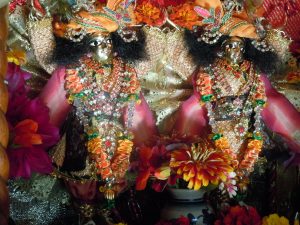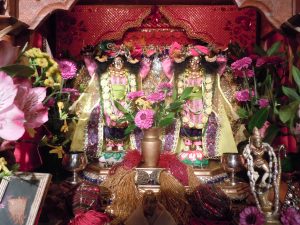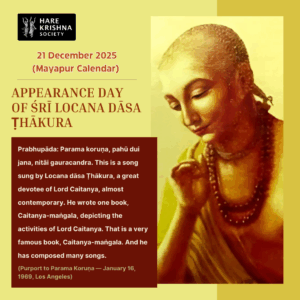Hari das thakur discusses namabhasa chanting with Lord Gauranga
Antya 3.49–One day Śrī Caitanya Mahāprabhu met Haridāsa Ṭhākura as usual, and in the course of discussion He inquired as follows.
Antya 3.50–“My dear Ṭhākura Haridāsa, in this age of Kali most people are bereft of Vedic culture, and therefore they are called yavanas. They are concerned only with killing cows and brahminical culture. In this way they all engage in sinful acts.
PURPORT-From this statement by Śrī Caitanya Mahāprabhu we can clearly understand that the word yavana does not refer only to a particular class of men. Anyone who is against the behavior of the Vedic principles is called a yavana. Such a yavana may be in India or outside of India. As described here, the symptom of yavanas is that they are violent killers of cows and brahminical culture. …. It is said that the Kṛṣṇa consciousness movement will be prominent within the next ten thousand years, but after that people will all become mlecchas and yavanas. Thus at the end of the yuga, Kṛṣṇa will appear as the Kalki avatāra and kill them without consideration.
Antya 3.51--“How will these yavanas be delivered? To My great unhappiness, I do not see any way.”
Antya 3.52-Haridāsa Ṭhākura replied, “My dear Lord, do not be in anxiety. Do not be unhappy to see the condition of the yavanas in material existence.
PURPORT-These words of Haridāsa Ṭhākura are just befitting a devotee who has dedicated his life and soul to the service of the Lord. When the Lord is unhappy because of the condition of the fallen souls, the devotee consoles Him, saying, “My dear Lord, do not be in anxiety.” This is service. Everyone should adopt the cause of Śrī Caitanya Mahāprabhu to try to relieve Him from the anxiety He feels. This is actually service to the Lord. One who tries to relieve Śrī Caitanya Mahāprabhu’s anxiety for the fallen souls is certainly a most dear and confidential devotee of the Lord. To blaspheme such a devotee who is trying his best to spread the cult of Śrī Caitanya Mahāprabhu is the greatest offense. One who does so is simply awaiting punishment for his envy.
Antya 3.53-“Because the yavanas are accustomed to saying, ‘hā rāma, hā rāma’ [O Lord Rāmacandra], they will very easily be delivered by this nāmābhāsa.
Antya 3.54-“A devotee in advanced ecstatic love exclaims, ‘O my Lord Rāmacandra! O my Lord Rāmacandra!’ But the yavanas also chant, ‘hā rāma, hā rāma!’ Just see their good fortune!”
Antya 3.55–Nāmācārya Haridāsa Ṭhākura, the authority on the chanting of the holy name, said, “The chanting of the Lord’s holy name to indicate something other than the Lord is an instance of nāmābhāsa. Even when the holy name is chanted in this way, its transcendental power is not destroyed.
Antya3.56-–“Even a mleccha who is being killed by the tusk of a boar and who cries in distress again and again, “hā rāma, hā rāma” attains liberation. What then to speak of those who chant the holy name with veneration and faith?”
PURPORT-This refers to an instance in which a meat-eater being killed by a boar uttered the words “hā rāma, hā rāma”again and again at the time of his death. Since this is a quotation from the Nṛsiṁha Purāṇa, this indicates that in the purāṇic age there must also have been mlecchas and yavanas (meateaters), and the words “hā rāma,, meaning “condemned,” were also uttered in those days. Thus Haridāsa Ṭhākura gives evidence that even a meat-eater who condemns something by uttering the words “hā rāma” gets the benefit of chanting the holy name that the devotee chants to mean “O my Lord Rāma.”
Antya 3.57--“Ajāmila was a great sinner during his life, but at the time of death he accidentally called for his youngest son, whose name was Nārāyaṇa, and the attendants of Lord Viṣṇu came to relieve him from the bonds of Yamarāja, the superintendent of death.
Antya 3.58-“The word ‘rāma’ consists of the two syllables, ‘rā’ and ‘ma.’ These are unseparated and are decorated with the loving word ‘hā,’ meaning ‘O.’
Antya 3.59-“The letters of the holy name have so much spiritual potency that they act even when uttered improperly.
PURPORT-Śrīla Bhaktisiddhānta Sarasvatī Ṭhākura states that the word vyavahita (“improperly uttered”) is not used here to refer to the mundane vibration of the letters of the alphabet. Such negligent utterance for the sense gratification of materialistic persons is not a vibration of transcendental sound. Utterance of the holy name while one engages in sense gratification is an impediment on the path toward achieving ecstatic love for Kṛṣṇa. On the other hand, if one who is eager for devotional service utters the holy name even partially or improperly, the holy name, who is identical with the Supreme Personality of Godhead, exhibits its spiritual potency because of that person’s offenseless utterance. Thus one is relieved from all unwanted practices, and one gradually awakens his dormant love for Kṛṣṇa.
Antya 3.60-“If a devotee once utters the holy name of the Lord, or if it penetrates his mind or enters his ear, which is the channel of aural reception, that holy name will certainly deliver him from material bondage, whether vibrated properly or improperly, with correct or incorrect grammar, and properly joined or vibrated in separate parts. O brāhmaṇa, the potency of the holy name is therefore certainly great. However, if one uses the vibration of the holy name for the benefit of the material body, for material wealth and followers, or under the influence of greed or atheism-in other words, if one utters the name with offenses-such chanting will not produce the desired result very soon. Therefore one should diligently avoid offenses in chanting the holy name of the Lord.’ “
PURPORT-This verse from the Padma Purāṇa is included in the Hari-bhakti-vilāsa (11.527) by Sanātana Gosvāmī. Therein Śrīla Sanātana Gosvāmī gives the following explanation:
This means that if one somehow or other hears, utters or remembers the holy name, or if it catches his mind while coming near his ears, that holy name, even if vibrated in separate words, will act. An example of such separation is given as follows:
Suppose one is using the two words “halaṁ riktam.” Now the syllable ha in the word “halam” and the syllable ri in “riktam” are separately pronounced, but nevertheless it will act because one somehow or other utters the word “hari.” Similarly, in the word “rāja-mahiṣī,” the syllables rā and ma appear in two separate words, but because they somehow or other appear together, the holy name rāma will act, provided there are no offenses.
The holy name has so much spiritual potency that it can deliver one from all sinful reactions and material entanglements, but utterance of the holy name will not be very soon fruitful if done to facilitate sinning.
The holy name is so powerful that it must act, but when one utters the holy name with offenses, its action will be delayed, not immediate, although in favorable circumstances the holy names of the Lord act very quickly.
Antya3.61–Nāmācārya Haridāsa Ṭhākura continued, “If one offenselessly utters the holy name even imperfectly, one can be freed from all the results of sinful life.
Antya3.62--“O reservoir of all good qualities, just worship Śrī Kṛṣṇa, the purifier of all purifiers, the most exalted of the personalities worshiped by choice poetry. Worship Him with a faithful, unflinching mind, without duplicity and in a highly elevated manner. Thus worship the Lord, whose name is like the sun, for just as a slight appearance of the sun dissipates the darkness of night, so a slight appearance of the holy name of Kṛṣṇa can drive away all the darkness of ignorance that arises in the heart due to greatly sinful activities performed in previous lives.”
PURPORT-This verse is found in Bhakti-rasāmṛta-sindhu (2.1.103).
Antya 3.63–“Even a faint light from the holy name of the Lord can eradicate all the reactions of sinful life.”
Antya 3.64--“While dying, Ajāmila chanted the holy name of the Lord, intending to call his son Nārāyaṇa. Nevertheless, he attained the spiritual world. What then to speak of those who chant the holy name with faith and reverence?’
Antya 3.65-“Because of even the faintest rays of the effulgence of the Lord’s holy name, one ca attain liberation. We can see this in all the revealed scriptures. The evidence appears in the story of Ajāmila in Śrīmad-Bhāgavatam.”
Antya 3.70-“My Lord, the moving entities who have heard Your loud saṅkīrtana have already been delivered from bondage to the material world, and after the nonmoving living entities like trees hear it, there is an echo.
Antya 3 71–“Actually, however, it is not an echo; it is the kīrtana of the nonmoving living entities. All this, although inconceivable, is possible by Your mercy.
Antya 3.78-79–Haridāsa said, “My Lord, as long as You are situated within the material world, You will send to the spiritual sky all the developed moving and nonmoving living entities in different species. Then again You will awaken the living entities who are not yet developed and engage them in activities.
Antya 3 80-In this way all moving and nonmoving living entities will come into existence, and the entire universe will be filled as it was previously.
PURPORT-While we are preaching, opposing elements sometimes argue, “If all living entities were delivered by the Kṛṣṇa consciousness movement, what would happen then? The universe would be devoid of living entities.” In answer to this, we may say that in a prison there are many prisoners, but if one thinks that the prison would be empty if all the prisoners adopted good behavior, he is incorrect. Even if all the prisoners within a jail are freed, other criminals will fill it again. A prison will never be vacant, for there are many prospective criminals who will fill the prison cells, even if the present criminals are freed by the government. As confirmed in Bhagavad-gītā, kāraṇaṁ guṇa-saṅgo ‘sya sad-asad-yoni-janmasu: “Because of the living entity’s association with material nature, he meets with good and evil among various species.” (Bg. 13.22) There are many unmanifested living entities covered by the mode of ignorance who will gradually come to the mode of passion. Most of them will become criminals because of their fruitive activities and again fill the prisons.
Antya 3.81–“Previously, when Lord Rāmacandra left this world, He took with Him all the living entities of Āyodhyā. Then He filled Āyodhyā again with other living entities.
Antya 3 82-“My dear Lord, You have set a plan in motion by descending on the material world, but no one can understand how You are acting.
Antya 3 83-“Formerly, when Lord Kṛṣṇa descended in Vṛndāvana, He freed all living entities in the universe from material existence in the same way.
Antya 3 86-“By descending as an incarnation at Navadvīpa, You, just like Kṛṣṇa, have already delivered all the living entities of the universe.
Antya 3.87–“One may say that he understands the glories of Śrī Caitanya Mahāprabhu. He may know whatever he may know, but as far as I am concerned, this is my conclusion.
Antya 3.88-“My dear Lord, Your pastimes are just like an ocean of nectar. It is not possible for me to conceive how great that ocean is or even to understand a drop of it.“
Antya 3.89–Hearing all this, Śrī Caitanya Mahāprabhu was astonished. “These are actually My confidential pastimes,” He thought. “How could Haridāsa have understood them?”
Antya 3.90--Greatly satisfied by the statements of Haridāsa Ṭhākura, Śrī Caitanya Mahāprabhu embraced him. Outwardly, however, He avoided further discussions of these matters.
Antya 3.91--This is a characteristic of the Supreme Personality of Godhead. Although He wants to cover His opulence, He cannot do so before His devotees. This is well-known everywhere.
Antya 3.47--The pastimes of Śrī Caitanya Mahāprabhu are deeper than millions of seas and oceans. Therefore no one can understand what He does nor why He does it.





